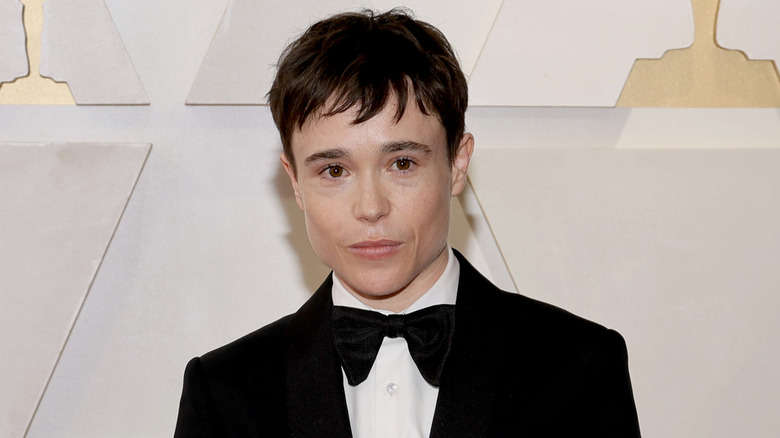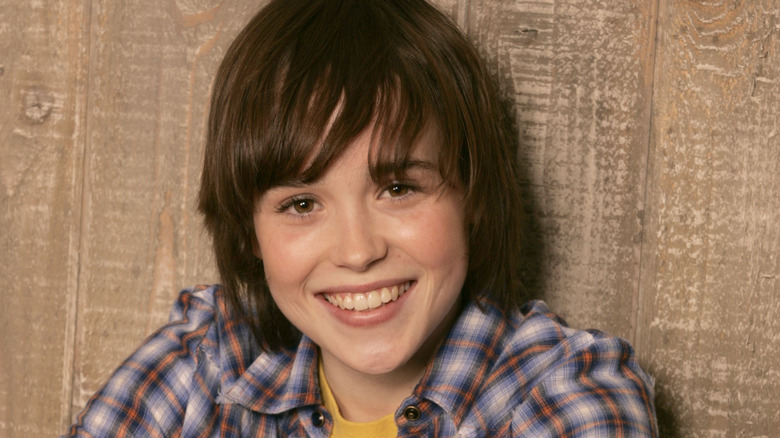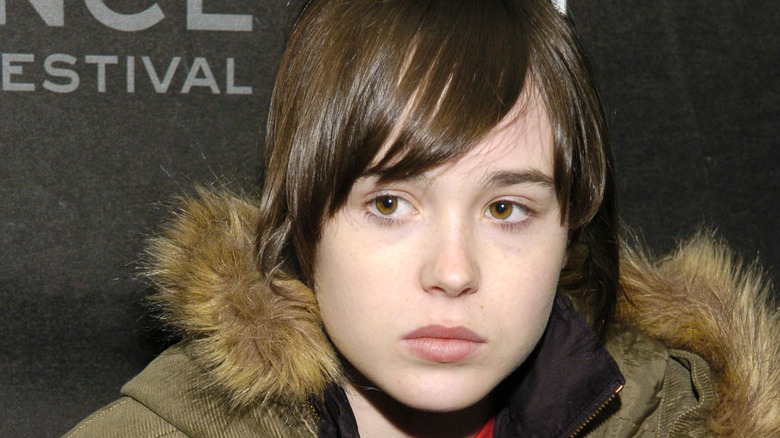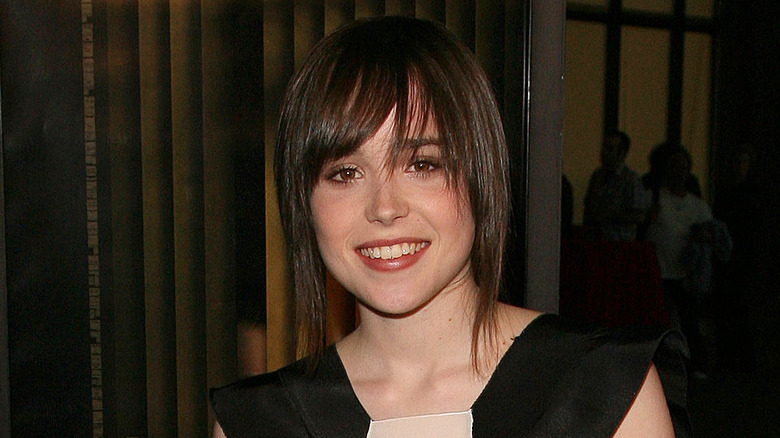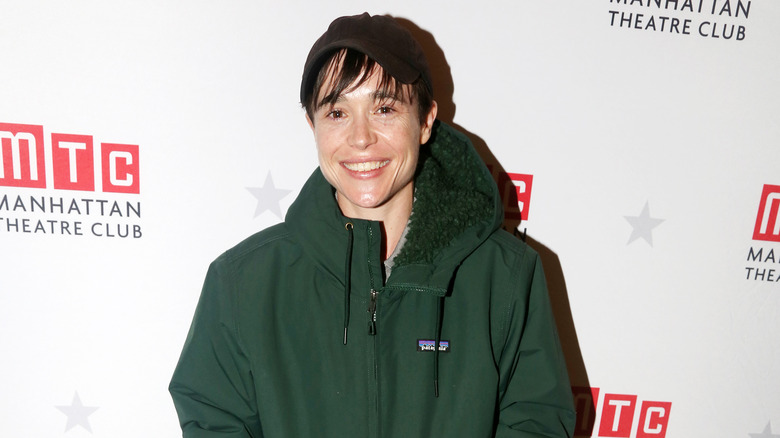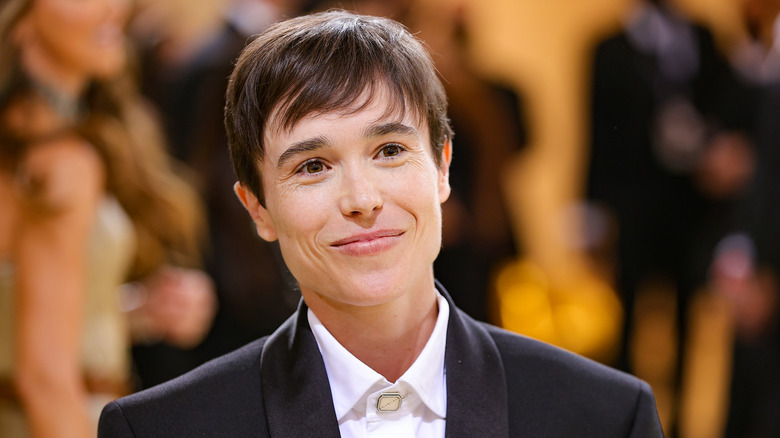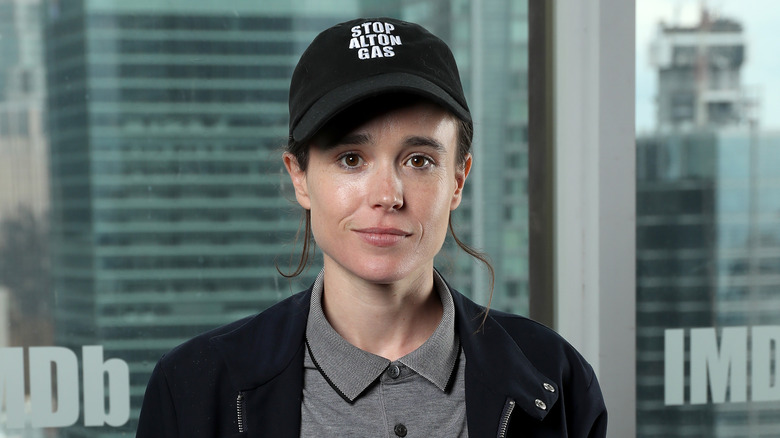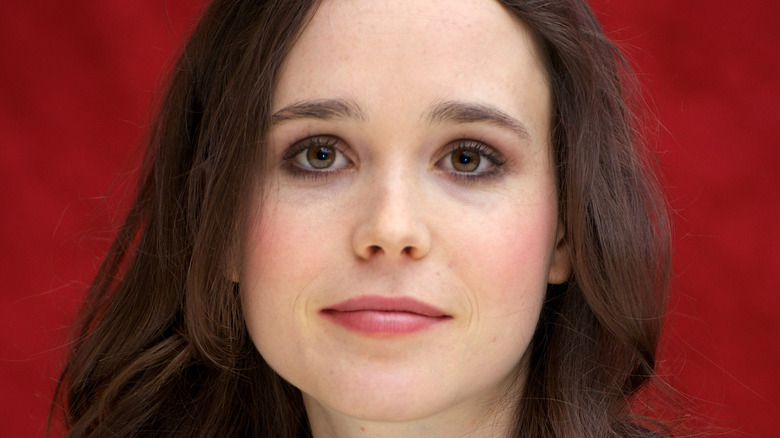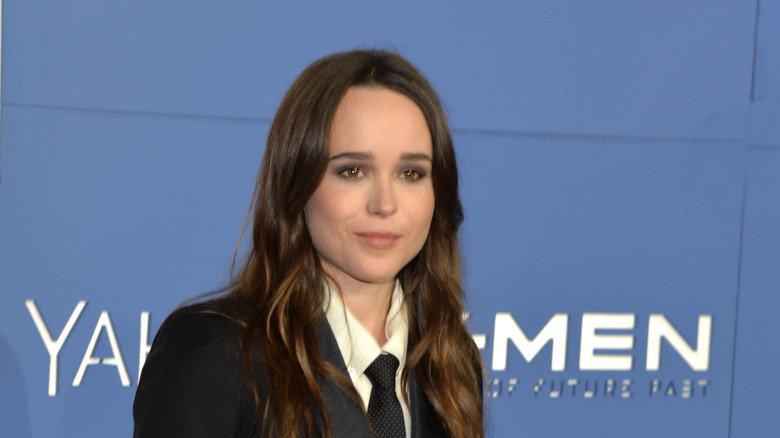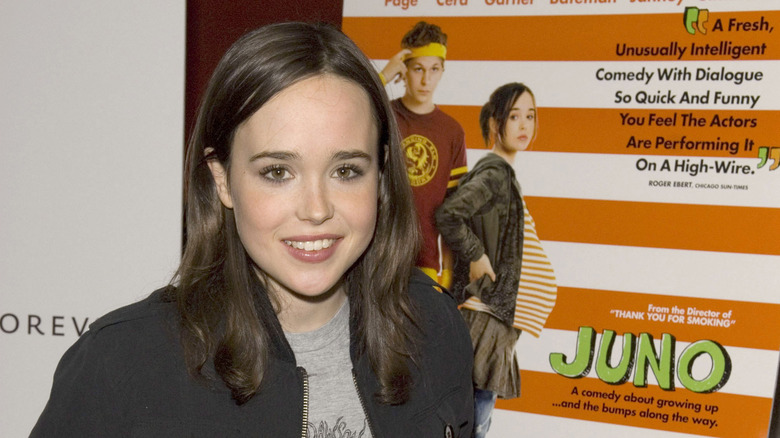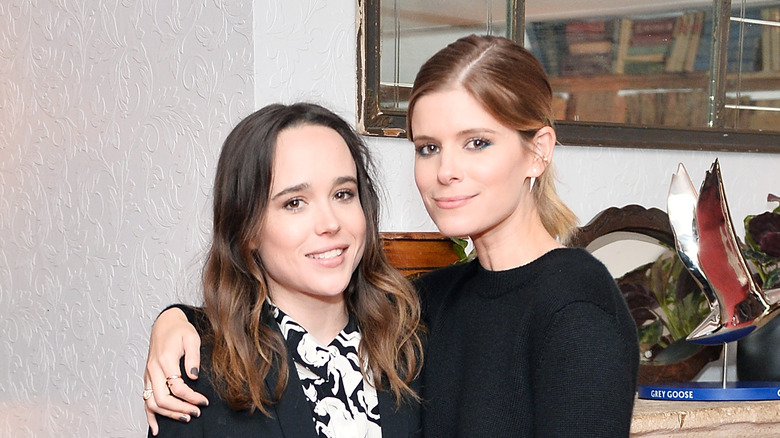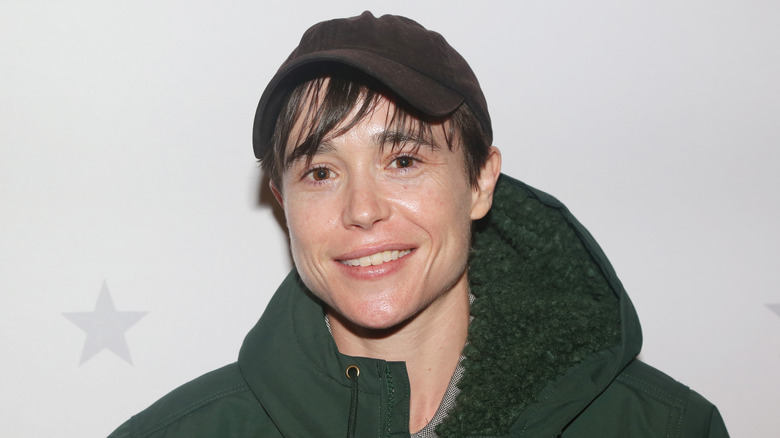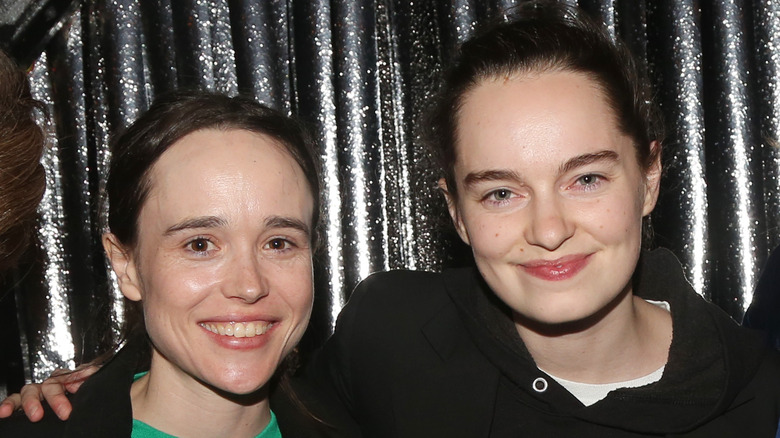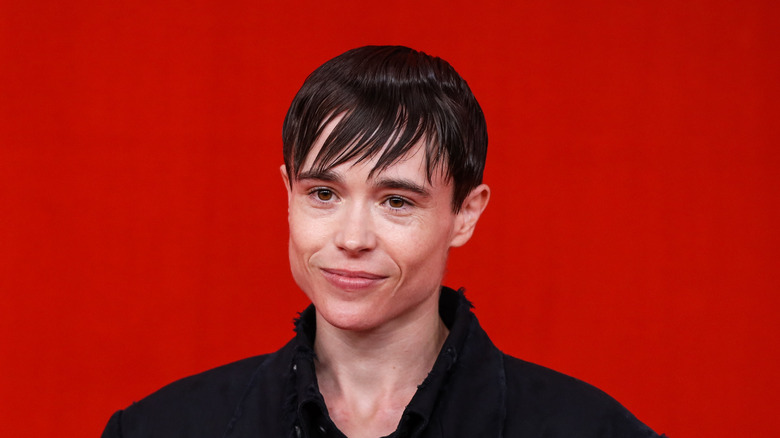Tragic Events Elliot Page Has Faced In His Life
A native of Halifax, on Canada's east coast, Elliot Page had already been acting for years in Canadian television when he burst on the scene in the 2005 psychological thriller "Hard Candy," playing a 14-year-old vigilante who lures and captures an older man the character believes to be a sexual predator. The power of that performance led to a role in 2006's "X-Men: The Last Stand," playing super-powered young mutant Kitty Pryde, a.k.a. Shadowcat. It was Page's next movie, however, that really put him on Hollywood's radar, the 2007 indie comedy "Juno," scoring him an Oscar nomination for his performance of titular Juno MacGuff, a wisecracking teenage girl coping with an accidental pregnancy. More major movies followed, including starring alongside Drew Barrymore and Kristin Wiig in the 2009 roller-derby drama "Whip It," and "Inception," director Christopher Nolan's big-budget, mind-bending heist thriller.
Page seemed to have it all, a popular movie star in his early 20s with a bright future beckoning. What nobody knew was the depth of the inner turmoil he was experiencing over not living the life he was supposed to be living. That all changed on December 20, 2020 when Page issued a statement via Twitter. "Hi friends, I want to share with you that I am trans, my pronouns are he/they and my name is Elliot," he wrote.
It hasn't been an easy journey, which will become clear by reading further for a look at the tragic events Elliot Page has faced in his life.
He's experienced body dysmorphia since childhood
The body dysmorphia that propelled Elliot Page to transition was hardly something new for him, but an unexplained yet deeply rooted feeling he'd been carrying with him since childhood. "All trans people are so different, and my story's absolutely just my story," Page explained in an interview with Vanity Fair. "But yes, when I was a little kid, absolutely, 100 percent, I was a boy. I knew I was a boy when I was a toddler." Page recalled writing secret letters that he would sign using the name Jason. His male identity, he noted, was something that had always been deeply ingrained in his psyche. "You feel it," he explained.
Prior to coming out as trans, Page appeared on "The Late Show with Stephen Colbert," where he was asked what kind of advice he would give to young actors, based on what he'd learned. Given the direction his life had yet to take, and the new identity he would soon embrace, Page's answer was both telling and prophetic. "I would give her a hug, and I would tell her she's not alone," Page said.
In a high-profile interview with Oprah Winfrey for her Apple TV+ series "The Oprah Conversation" (via The Guardian), Page explained how transitioning had reintroduced him to the person he used to be, a long time ago. "This is incredibly new," he declared. "I feel like I haven't gotten to be myself since I was 10 years old."
His early success as a child actor locked him into female roles
The acting bug bit Elliot Page early on. "I always wanted my mum to take me to the school plays, even if I didn't know what they were about," Page told Esquire of the fascination he developed toward acting when he was a young child. "There was some kind of urge to be in places like that," he said, explaining his attraction to theatre.
That urge eventually took him from school plays to television studios when he began to act professionally, booking his first TV role — in the Halifax-shot Canadian TV drama "The Pit Pony" — when he was just 10 years old. Page demonstrated talent beyond his years, landing more acting work in other Canadian TV series, including cult comedy "Trailer Park Boys," and Canadian made-for-TV movies such as "Ghost Cat," and "I Downloaded a Ghost."
What didn't appear clear until years later was the irony that Page's success came at the detriment of living his truth, since that early success came from playing female roles. As he continued to pursue an acting career, Page essentially became trapped in playing female roles as he continued to struggle with body dysmorphia. "I became a professional actor at the age of 10," Page explained in an interview with Time of the compromise he was forced to strike in order to maintain and build his career. "Of course I had to look a certain way."
Going through puberty caused him to 'disconnect' from himself
Adolescence was a particularly difficult time for Elliot Page. As a child, he unconsciously identified as male, and eventually consciously desired to be male. "I felt like a boy," Page told Time. "I wanted to be a boy. I would ask my mom if I could be someday." When Page began going through puberty, however, everything changed.
"When my body started to change, clothes sat on me differently, and all of that was just the beginning of really sort of disconnecting from myself and feeling a degree of discomfort that was very erosive and damaging," Page said in a 2023 ABC television special, titled "The Freedom to Exist with Elliot Page: A Soul of a Nation Presentation" (via Yahoo! Finance).
"I think with gender dysphoria, it's being assigned a gender at birth based on your genitalia and that not being the reality of who you are, [a] sort of incongruence and disconnect with that just continues to chip away at you," Page said of the impact that gender dysphoria continued to have on his mental health throughout his teenage years. Ironically, his focus on acting and the success he was experiencing at a young age only served to muddy the waters even further. "I think it especially became complicated as an actor because people would just go, 'You're an actor, just put the f–king clothes on,'" he recalled.
He had no trans role models growing up
The body dysmorphia that Elliot Page experienced throughout his adolescence created a lot of confusion and inner turmoil. During that time, he felt like he was alone in grappling with the feelings he was having. Unfortunately, transgender role models were few and far between for him during those years.
With nobody on which to model himself, nor any mentors to guide him through the complex feelings he was experiencing, Page felt adrift — even as his acting career continued its successful upward trajectory. That, however, only exacerbated those feelings, particularly when he was forced to wear dresses and makeup for red-carpet appearances at movie premieres. "I just never recognized myself," Page told Time of seeing photos of himself on those red carpets. "For a long time I could not even look at a photo of myself," he admitted.
After his metamorphosis into Elliot, Page embraced the idea that he could be the kind of role model he wished he could have had when he was growing up. As he told Time, he views it as his responsibility to use his celebrity as a platform to encourage and inspire others who are going through experiences similar to those that he did. "My privilege has allowed me to have resources to get through and to be where I am today," Page explained, "and of course I want to use that privilege and platform to help in the ways I can."
His religious family resisted his efforts to find his true self
Elliot Page comes from a religious family background. As he told the Los Angeles Times, his grandfather was an Anglican minister, and he was brought up in a strict and religious household. While he struggled to figure out his own sexuality as a teenager, Page wasn't met with a whole lot of support; as he told the Times, his mother once bluntly told him during a conversation that "homosexuality didn't exist." Meanwhile, when teenage Page shaved his head for an acting role, his grandmother expressed her fears that, using a crude slur, he was a lesbian.
It hasn't been smooth sailing, but Page happily reported that his mother eventually came to a place of acceptance. "I think it's really inspiring that she's changed and become such an advocate and ally," Page said of his mom. "It took her time to break out of the ideas she grew up with."
That hadn't been the case with his father, with whom Page has been estranged for more several years. As the Times pointed out, their relationship deteriorated even further when his father liked a transphobic social media post from controversial right-wing author Jordan Peterson, directed specifically at Page. "I have no clue what my father thinks of his son at this point, what he says, how he explains my absence," Page wrote of his family estrangement in his memoir, "Pageboy," as excerpted by USA Today.
He was plagued with depression and anxiety
As Elliot Page's star rose in Hollywood, so too did the confusion and anguish he was experiencing from gender dysphoria. Despite the professional high of receiving an Oscar nomination for "Juno" at age 20 — becoming the fourth-youngest actor ever to receive an Academy Award nomination — Page was barely holding it together in his personal life.
"The success of 'Juno' coincided with people in the industry telling me no one could know I was queer," Page wrote in her memoir, "Pageboy," via an excerpt published in USA Today. At the time, Page's advisers told him to keep his sexuality under wraps. In TV appearances, press interviews and red carpet galas, Page was instructed to smile, play the game, and present an image to the world as a heterosexual female, all to ensure his burgeoning career wouldn't take a hit due to his sexuality. "So I put on the dresses and the makeup," he wrote. "I did the photo shoots.
However, following that advice came at a high price for Page's already deteriorating mental health. "Intense depression, anxiety, severe panic attacks. I couldn't function," Page recalled of his mental state during that time, in an essay he wrote for Esquire. Page realized how bad things had become when he could barely get through meetings, being unable to focus enough to read a script. "Reading is one of my favorite things to do — I couldn't read, couldn't get through a paragraph," Page recalled.
He's tried to harm himself by cutting and restricting food
During the years when Elliot Page came to the understanding that he was transgender, those inner struggles manifested in self-destructive behavior. As he wrote in his memoir "Pageboy" (via USA Today), the walls of the metaphorical closet he'd been forced into were closing in. "The closet was grueling, it suffocated me," he wrote, noting that one of the ways in which he expressed himself was by slicing his skin with a razor, a practice known as cutting.
It was during this time that he also developed another self-destructive behavior by restricting food. "I struggled with food," Page wrote in an essay for Esquire. This led him to lose a dangerous amount of weight, his body reflecting the stress he was experiencing mentally. "I dropped to eighty-four pounds," Page wrote in "Pageboy." "My arms were so skinny I could take the outer sleeve of a to-go coffee cup, stick my hand through and slide it up my arm, beyond my elbow and to my shoulder. Wasting away."
While Page wrote that he never contemplated taking his own life during that period, he could certainly understand the urge. "Yeah, I can relate deeply," he wrote. "And not only to the very conscious, direct act of doing it but also certain times when I lost so much weight or when I was having such severe panic attacks and collapsed multiple times — all these things that very easily could, and statistically do, lead to death."
Being forced to wear a dress at the Inception premiere caused him to collapse
For Elliot Page, the battle between his inner feelings and the career pressure he was feeling to present as female came to a head during the promotional tour for "Inception," in which Page played Ariadne, the architect who created the "dream" structures featured in the visually stunning and very trippy film.
Understandably, what he was feeling inside was at such odds with the demands placed on him for his career, it was inevitable that a crash would come. "I was being told to lie and hide," Page wrote in "Pageboy" (via USA Today).
As Page explained in an interview with Oprah Winfrey's "The Oprah Conversation," he hadn't yet come to the realization that he was trans, yet had also come to realize that wearing feminine attire such as dresses and gowns on red carpets had been doing a number on his mental health. According to Page, the you-know-what hit the fan when his manager presented him with three different dresses from which to choose for his appearance on the red carpet. "And I just like, I like, I lost it," Page said, as reported by Entertainment Weekly. "It was like a cinematic moment, you know, the kind of like thing that would be in a movie ... And that night, after the premiere, and at the after-party, I collapsed and that was something that's happened frequently in my life, usually corresponding with a panic attack."
He felt 'violated' when a director outed him at 18 in a horrific and humiliating manner
It's easy to forget just how young Elliot Page was when his meteoric Hollywood career really took off. Following his Oscar nomination for "Juno," he became part of one of filmdom's biggest superhero franchises when he was cast in 2006's "X-Men: The Last Stand". While that role certainly cemented his stardom, it was also an intensely painful time that was made infinitely more so by the film's director, Brett Ratner.
Shortly after Ratner's career cratered when he was accused of sexual misconduct by six different women, Page shared an appalling anecdote involving the director. In a lengthy Facebook post, since deleted but preserved by People, Page alleged that Ratner, in front of all his co-stars prior to the start of filming, told another woman, "You should f–k her to make her realize she's gay."
Page was dumbstruck. "I was a young adult who had not yet come out to myself. I knew I was gay, but did not know, so to speak," Page wrote. "I felt violated when this happened. I looked down at my feet, didn't say a word and watched as no one else did either ... He 'outed' me with no regard for my well-being, an act we all recognize as homophobic." Page's co-star Anna Paquin backed up his account, taking to Twitter to writer, "I was there when that comment was made. I stand with you."
He was verbally assaulted by an obnoxious Hollywood A-lister after coming out as gay
While Elliot Page wasn't afraid to single out Brett Ratner by name, he recounted another vile encounter with someone he described as an A-list male actor. Recounting the incident in "Pageboy," in a chapter aptly titled "Famous A–hole at Party," Page described what took place at a 2014 party he attended in Los Angeles. The actor, whom Page knew in passing, went off on a tirade about Page's recent public declaration of homosexuality.
"You aren't gay. That doesn't exist. You are just afraid of men," the actor, whom Page described as an "acquaintance," told him at the party (via Variety). The A-lister's tirade grew worse, escalating to a creepy threat. "I'm going to f–k you to make you realize you aren't gay," he told Page. Page wound up running into the actor a few days later when both were working out at the same gym, where the guy attempted to downplay what he'd said. "I don't have a problem with gay people, I swear," Page recalled him saying, but didn't find his protestations to be particularly convincing. "I think you might," Page responded.
Speaking with People about the incident, Page explained that while he purposely didn't name the actor, there were numerous people at that same party who witnessed the exchange, and heard what he had said. "But he will hear about this and know it's him," Page said.
His doomed romance with Kate Mara ended in heartbreak
In his memoir, Elliot Page opened up about his romance with fellow actor Kate Mara. "The first person I fell for after my heart was broken was Kate Mara," Page wrote in "Pageboy" (via People), noting that at the time of the relationship Mara inconveniently had a boyfriend, "The Handmaid's Tale" actor Max Minghella. The relationship proved to be a confusing one for Mara; Page recalled her telling him, "I never thought I could be in love with two people and now I know I can."
Looking back at the relationship with the wisdom of hindsight, Page came to see that he was in a vulnerable state at the time, having just endured a devastating, heartbreaking breakup. "I think my relationship, or whatever you want to call it with Kate, very much encapsulates a certain dynamic that I consistently found myself in, which was falling for people that — I think a lot of us do this — who aren't fully available," Page explained, something which he came to recognize as a pattern.
According to Page, he and Mara have remained friends over the years, even as Mara became mother of two children, whom she shares with husband Jamie Bell. "I think the love and care that we have for each other is its very own special thing," Page said of Mara. "Separate from the intimacy that I write about."
A closeted co-star forced them to keep their relationship top secret
Writing in "Pageboy," Elliot Page recounted another romantic relationship, with a closeted female actor whom he declined to identify, but called "Ryan." According to Page, the relationship lasted for two years, and was kept so top secret that all but a few close friends knew about it. "Her parents did not know," Page wrote, via Page Six. "I was the friend that came for Christmas ... We never touched outside, we barely went to dinner."
Even though they went to extreme lengths to keep their romance hidden, Page wrote that "Ryan" was unable to deal with the shame of being gay, and ultimately broke it off. His heart shattered, Page recalled later running into "Ryan" at a party — accompanied by a male date. Humiliated and heartbroken, Page fled, claiming to be suffering from food poisoning — which led that male date to kindly offer some coconut water to settle Page's stomach. "He had no idea about our history of course," Page wrote. "It was a kind gesture, but I wanted to take that coconut water and throw it."
Looking back, Page still feels the love they shared was real, but simply unable to flourish in the darkness of the closet. "Ultimately, I do think she loved me," Page told People. "But feeling hidden was far too painful. That was impossible and not a sustainable relationship at all. And it taught me that I was not gonna do that again."
His marriage to Emma Portner ended in divorce
With all those failed romances under his belt, Elliot Page finally found love with dancer (and fellow Canadian) Emma Portner. After going public with their relationship in 2017, they tied the knot the following year. In December 2020, shortly after Page came out as transgender, Portner issued a public statement of support. "Elliot's existence is a gift in and of itself. Shine on sweet E. Love you so much," wrote Portner in a since-deleted Instagram post, as reported by Page Six.
Despite that public display of solidarity, the situation was apparently far different behind the scenes. Less than a month later, Page Six obtained court documents revealing that Page filed for divorce after just three years of marriage. "After much thought and careful consideration, we have made the difficult decision to divorce following our separation last summer," the two said in a joint statement, revealing they'd actually split months earlier. "We have the utmost respect for each other and remain close friends."
As he wrote in "Pageboy," via Us Weekly, Page came to understand that the decision to get married was actually his unconscious way of delaying the facing the truths about himself that he would eventually confront. "If a part of you is always separate, if existing in your body feels unbearable — love is an irresistible escape," he wrote. "And ultimately, it had nothing to do with Emma."
He's been hit with transphobic backlash from lesbians
Elliot Page's journey has been a very public one, coming of age under the harsh glare of the spotlight. After coming out as transgender, the criticism Page received from the likes of right-wing gadfly Jordan Peterson were certainly predictable. The backlash he received from gay women, on the other hand, was not.
That was evident in social media responses to Page's announcement that he was trans, with some lesbians lamenting the loss of a high-profile gay woman in Hollywood. In one example, a Twitter user celebrated Page coming out as trans, but with a caveat. "But my heart also breaks as the lesbian community grows smaller. Again. And loses a role model. Again," the tweet read. Another tweet (since deleted but preserved by posterity at The Daily Dot) echoed that sentiment, reading, "As a lesbian, I would have never thought @TheElliotPage would make me livid ... And the other celeb lesbians applauding this bulls*** is unreal betrayal of all lesbians."
Another tweet put an even finer point on the anger some gay women expressed about Page's transition, writing, "Some lesbians are internally misogynistic and want to be anything other than a woman." Another offered a theory, insisting that Page's decision to come out as transgender came about from his refusal to embrace his own femininity. "And so they shift from identifying as lesbian women to straight men," the Twitter user wrote. "Compulsory heterosexuality all over again."

